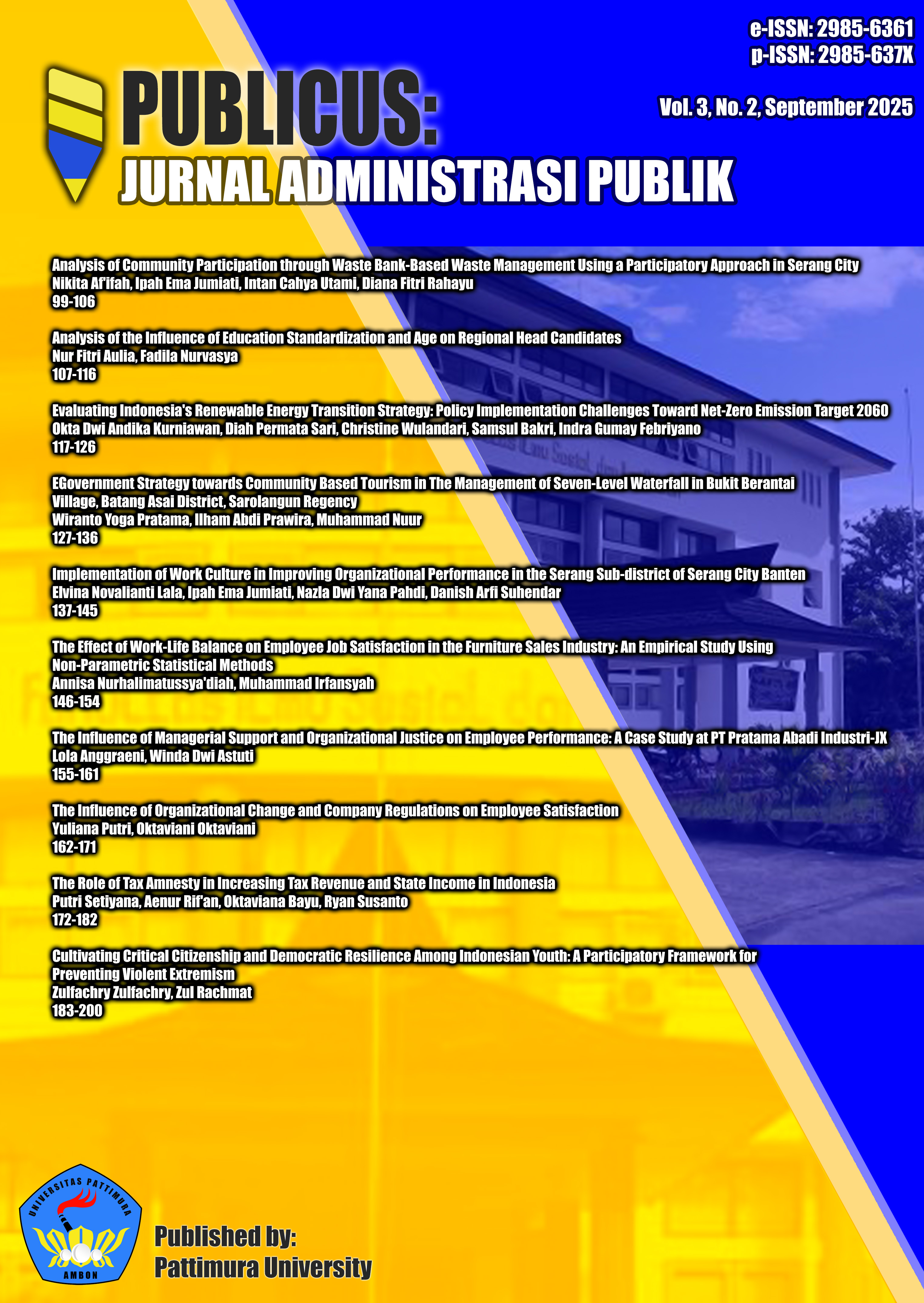Evaluating Indonesia's Renewable Energy Transition Strategy: Policy Implementation Challenges Toward Net-Zero Emission Target 2060
Abstract
Indonesia, as the world's largest archipelagic nation, faces complex challenges in achieving its net-zero emission target by 2060. This research analyzes the implementation of Indonesia's new and renewable energy (NRE) policies through a comprehensive literature study approach. Despite having strong legal foundations through Law No. 30/2007 and Government Regulation No. 79/2014, along with ambitious targets of 23% renewable energy by 2025, implementation realization still encounters significant obstacles. National Energy Council data shows that renewable energy share has only reached 15%, far from the established targets. Analysis of three projection scenarios from the Ministry of Energy and Mineral Resources - Business as Usual (BaU), Sustainable Development (SD), and Low Carbon (LC) - indicates that the SD scenario can achieve the 23% target by 2025 and even exceed the 31% target by 2050. Research findings demonstrate that although Indonesia possesses abundant renewable energy resource potential and clear political commitment, strengthening law enforcement, infrastructure investment, and inter-stakeholder coordination are required to realize sustainable energy transition toward net-zero emission.
Downloads
References
Abyan, N. (2025). Transition towards a Green Economy in Sustainable Growth: an Analysis of Regulation and Practice in Indonesia. Clean and Sustainability Business, 1(1), 16–28.
Azhar, M., & Satriawan, D. A. (2018). Implementasi kebijakan energi baru dan energi terbarukan dalam rangka ketahanan energi nasional. Administrative Law and Governance Journal, 1(4), 398–412.
Bakri, S., Yuwono, S. D., Sulistiowati, R., Septyastuti, S., Nurhaida, I., & Kurniasari, N. (2024). Can the Application of Agroforestry at Monocultural Food Crop Areas Support Manufacturer Chemical Fertilizer Reduction Programs without Sacrificing Farmers’income? The American Journal of Social Science and Education Innovations, 6(05), 101–114.
Cadman, T. (2018). The United Nations framework convention on climate change. In The Palgrave handbook of contemporary international political economy (pp. 359–375). Springer.
Canton, H. (2021). International energy agency—IEA. In The europa directory of international organizations 2021 (pp. 684–686). Routledge.
Febryano, I. G., Hardian, D., Supono, S., Damai, A. A., Widiastuti, E. L., & Novriyanti, N. (2021). Perception of Fisherman and Government Officer on Policy Implementation of Cantrang Prohibition in Lampung Bay. International Conference on Sustainable Biomass (ICSB 2019), 54–58.
Haryanto, B., Supriatna, J., Nurlambang, T., & Marsum. (2024). Status of Nationally Determined Contributions in Indonesia: A Review on Climate Change Health Impacts. Climate Change and Human Health Scenarios: International Case Studies, 115–128.
Hayden, F. G. (2002). Policymaking network of the iron-triangle subgovernment for licensing hazardous waste facilities. Journal of Economic Issues, 36(2), 477–484.
Indonesia, R. (2014). Peraturan Pemerintah Republik Indonesia No. 79 Tahun 2014 tentang Kebijakan Energi Nasional. Lembaran Negara RI Tahun, 300.
Kurniawan, I., Ichwani, R., Fionasari, R., Batubara, A., & Huda, A. (2022). Indonesia’s renewable energy outlook: what to expect in the future renewable energy of Indonesia. a brief review. Elkawnie: Journal of Islamic Science and Technology, 8(2), 298–313.
Listrik, R. (2021). Rencana Usaha Penyediaan Tenaga Listrik (RUPTL) PT. PLN (Persero), 2030, 13–14.
Muhammad, A. C., Santoso, H., Purnama, Y. A., Parenden, D., Dewadi, F. M., Dewi, R. P., Winardi, B., & Lillahulhaq, Z. (2023). Konversi Energi. Global Eksekutif Teknologi.
Norlyanti, N. (2018). 24. Indonesia Non-Permanent Member of United Nations Security Council. 5th International Conference on Social and Political Sciences (IcoSaPS 2018), 120–125.
Rahayu, L. N., & Windarta, J. (2022). Tinjauan potensi dan kebijakan pengembangan PLTA dan PLTMH di Indonesia. Jurnal Energi Baru Dan Terbarukan, 3(2), 88–98.
Suoneto, N., & Paramitha, G. (2021). Indonesia’s Participation at COP26. The Diplomat.
Wulandari, C., Budiono, P., & Ekayani, M. (2019). Impacts of the new decentralization law 23/2014 to the implementation of community based forest management in Lampung Province, Indonesia. IOP Conference Series: Earth and Environmental Science, 285(1), 012006.
Copyright (c) 2025 Okta Dwi Andika Kurniawan, Diah Permata Sari, Christine Wulandari, Samsul Bakri, Indra Gumay Febriyano

This work is licensed under a Creative Commons Attribution 4.0 International License.





.png)




